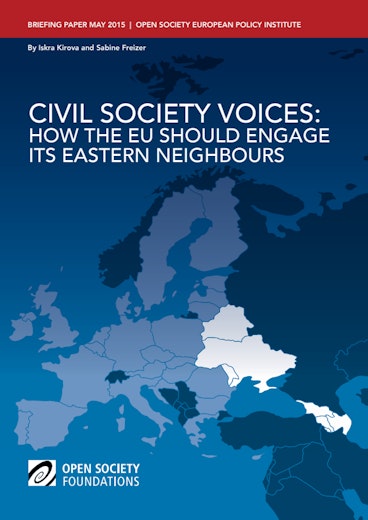BRUSSELS—Amidst an uneasy ceasefire in Ukraine and uncertainty in Brussels as to what the Kremlin will do next, heads of state and government from the European Union and the six countries of the Eastern Partnership (Armenia, Azerbaijan, Belarus, Georgia, Moldova, and Ukraine) will discuss the future of their relations at the Riga Summit on May 21–22.
A new report by the Open Society Foundations finds that the Eastern Partnership remains the EU’s most effective foreign policy instrument to build accountable and stable institutions and states in the region and reinforce neighbors’ sovereignty. The Partnership has had a real influence in the region, supporting largely peaceful homegrown change in Georgia and Moldova. Its most dramatic political effects were manifested in Ukraine’s Euromaidan movement.
“There is a risk that EU leaders in Riga will backtrack from the Eastern Partnership instead of endorsing a stronger and more ambitious engagement. Events in Ukraine caught most EU member states by surprise in 2014 and exposed the deeper political nature of the partnership,” said Iskra Kirova, an author of the report and Open Society’s Eastern Europe policy analyst. “Russia’s resurgence and the resistance of regional elites to reform require a re-evaluation of the policy. But the EU should seek to strengthen its carrots and sticks, and strengthen reformers, rather than pull back,” Kirova added.
The report offers unique insight into the expectations and concerns of experts and civil society leaders from the six eastern partners about their countries’ future ties with the EU. These individuals have carried the democracy agenda for decades through changes of government, and remain the EU’s strongest allies today in promoting reforms and democratic values.
“The Open Society Foundations and its local partners call on EU leaders to reaffirm their commitment to the region and continue with an ambitious, forward-looking reform program for all eastern neighbors. The only way to get to good governance and stability is through domestically driven reform. For more than 20 years, the EU has cultivated reformist actors, in or out of power, in the whole region. Now would be the worst time to undermine them, and its own interests, by wavering in its commitment and principles,” said Heather Grabbe, director of the Open Society European Policy Institute.
Not all governments have shown the same level of interest in EU integration. Georgia, Moldova, and Ukraine have signed association agreements with the EU, while Armenia, Azerbaijan, and Belarus are mainly interested in mobility, trade, and financial assistance, and broadening their foreign policy options. The EU has levers with each partner, and all stand to gain from closer relations. If the EU gave up in the more difficult countries, it would lose an opportunity to stimulate change when political conditions become more favorable.
“Stable and prosperous countries in its neighborhood are the best guarantee for EU security. The Eastern Partnership can help protect this strategic interest, but member states need to come together behind a shared understanding of the EU’s goals in the region and its tools to achieve them,” said Sabine Freizer, senior fellow at the Atlantic Council and the other author of the report.
The report highlights concerns from civil society leaders and offers recommendations on how the EU can make the Eastern Partnership more effective and advance the EU’s interests:
- To strengthen regional stability, the EU should help bear the high political, economic, and security costs of European integration for Ukraine, Georgia, and Moldova. It should reaffirm those states’ sovereign right to pursue closer relations with the EU, including the perspective of EU membership, if and when they meet the criteria.
- The EU has an interest to sustain cooperation with Armenia, Azerbaijan, and Belarus to increase energy security, regulate migration, and counter terrorism and other security threats. Rather than working towards political association and economic integration, the EU can focus on a narrower set of issues on the basis of binding mutual commitments. When the EU’s fundamental interests—which include respect of basic human rights—are violated, it should apply targeted sanctions.
- The EU can do more to contain the influence of oligarchic interests and self-serving elites and invest in anticorruption, linking the fight against corruption at home with efforts in the neighborhood. The Eastern Partnership should prioritize reform in justice and home affairs institutions, and explore synergies with existing-practice EU support for security-sector reform to increase institutional and state stability.
Read more
publication
Civil Society Voices: How the EU Should Engage Its Eastern Neighbours

This paper highlights local concerns and expectations about the European Union’s role in its “eastern neighbourhood” and recommends ways the EU can become more influential in the region.
Resilience in Moldova
Q&A: Moldova’s Path to a European Future

Moldova has endured the Kremlin’s aggression because it has chosen to leave Russia's sphere of influence and supports Ukraine. The impact of the war on daily life—and why the nation is determined to join the EU.
Rethinking the EU
In an Age of Crisis, an Opportunity to Remake the EU

From climate change to rising authoritarianism, Europe is facing a range of crises that threaten the way we live. The EU must seize the opportunity to reshape how it works and rethink what role it plays in a changing world.